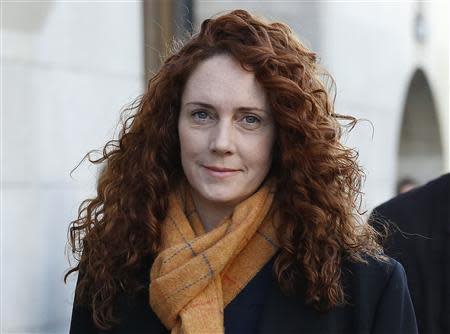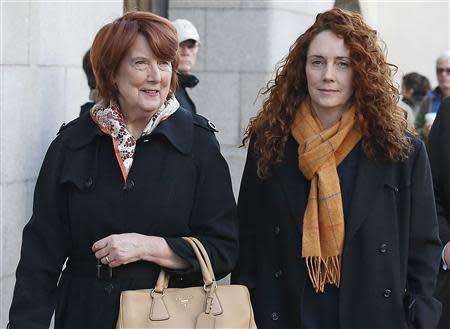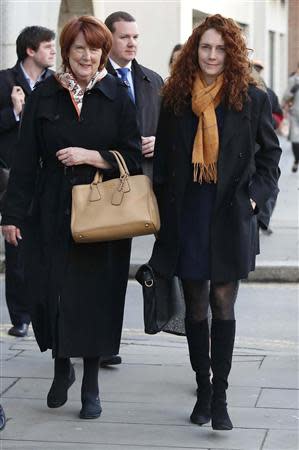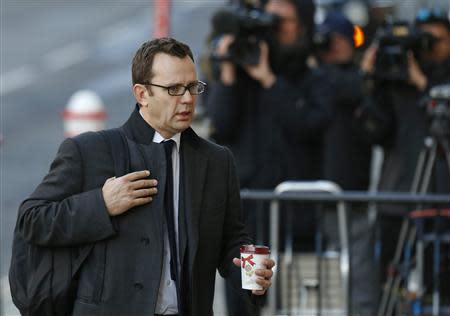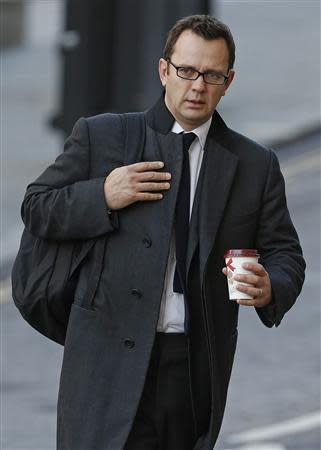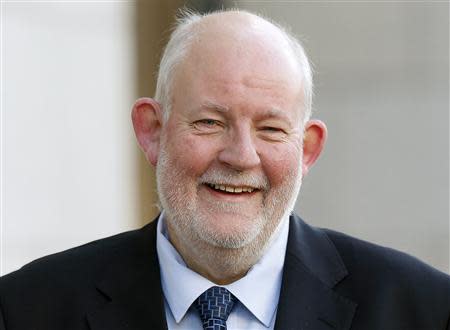Love, money and power in Britain's phone hacking drama
By Guy Faulconbridge, Michael Holden and Kate Holton LONDON (Reuters) - In a reversal of fortune fit for one of their own front pages, two British former tabloid editors have witnessed the dissection of their private and professional lives in the full glare of the media at a trial in London's most famous criminal court. Rebekah Brooks and Andy Coulson, once Rupert Murdoch's most influential British newspaper chiefs, deny conspiracy to hack the telephone messages of princes, politicians and the public in a highly competitive quest for exclusive stories. Prosecutor Andrew Edis has argued the two editors conspired in the phone hacking that ultimately forced Murdoch to close England's best-selling newspaper, prompted the state to impose media regulation, and exposed the cosy ties between the press and Britain's ruling elite. Revealing that Brooks and Coulson, both 45, had a secret six-year affair, Edis said their intimacy, position and control of the purse strings meant they knew phones were being hacked, including that of a missing schoolgirl later found murdered, "What Mr Coulson knew, Mrs Brooks knew too. What Mrs Brooks knew, Mr Coulson knew too," Edis, in wig, white collar, and black gown, told court Number 12 of the Old Bailey. "It isn't simply that there was an affair, it isn't to do with whether they have sexual relations with one another, (it is to do with) how close were they ... and they were very close." Sitting side-by-side behind glass in the dock, Brooks, a friend of Prime Minister David Cameron, and Coulson, who later worked for Cameron as his chief spokesman, remained stony faced in the hushed court when Edis revealed their liaison. Newspapers splashed the affair across their front pages, stoking interest in a trial that is enthralling Britain. "The affair they didn't expose," The Independent said on its front page, while Murdoch's The Times went with "Editors and lovers - couple at heart of hacking trial." The affair began in 1998 and continued for at least six years, during which time Brooks - whose maiden name was Wade - married her first husband, TV soap actor Ross Kemp, in 2002. After divorcing Kemp in 2009, she married her current husband, Charlie Brooks, later that year. Coulson married in 2000. Photographers greet the editors who once directed Britain's most aggressive tabloid journalists a blizzard of flashbulbs on arrival at court. The Old Bailey has set up an overflow room for reporters who cannot fit inside the court. The trial could last six months due to the complexity of the case. No matter what the verdict, the trial mirrors the fall from grace of the British tabloids. Editors who once struck fear into the hearts of prime ministers are now struggling against regulation they say threatens three centuries of press freedom. Such is the media frenzy that judge John Saunders told the jury that they must ignore the publicity. "Not only are the defendants on trial but British justice is on trial," he said at the opening of proceedings on October 29. PUBLIC OUTCRY Public outcry at revelations that the News of the World had hacked the phone of missing schoolgirl Milly Dowler, who was 13, forced Murdoch to close the paper in July 2011. When called before British MPs that month, Murdoch said he was humbled by the scandal and had been betrayed by people he had trusted at the paper. He said he had not been aware of the extent of hacking at the paper. He later told a media inquiry in 2012 it was a serious blot on his reputation. Former News of the World chief correspondent Neville Thurlbeck, former assistant news editor James Weatherup, and former news editor Greg Miskiw pleaded guilty to conspiracy to intercept communications before the case came to trial, the court heard. Setting out the prosecution case, Edis said a private detective working for the News of the World, Glenn Mulcaire, had also earlier pleaded guilty to charges of hacking phones including that of Milly Dowler. Brooks was News of the World editor at the time of Dowler's disappearance in 2002. The prosecutor argued that Brooks and Coulson, who was her deputy editor at the time, must have known about the hacking since Brooks set up the investigations unit with Mulcaire as a member of the team. He was given a formal retainer by the paper on September 1, 2001 worth 92,000 pounds ($148,000) a year, later increased by Coulson to over 100,000 pounds a year. "If these people were doing their jobs properly, we say they must have known where these stories came from," Edis said. The court heard how Brooks sought to reassure Coulson about his apparent lack of contact with Murdoch, and of her deep affection for her fellow journalist. "You are my very best friend. I tell you everything, I confide in you, I seek your advice, I love you, care about you, worry about you," she wrote to Coulson. "We laugh and cry together." The affair began in 1998 and appeared to be ending in 2004, the court heard. Coulson went to work as Cameron's spokesman in 2007, following him into Downing Street in 2010 before resigning a year later as the phone hacking scandal escalated. Cameron's spokesman declined to comment. "NOT GUILTY" In English criminal courts, the prosecution makes its case before the defence. Lawyers for Brooks have not yet done so though Coulson's lawyer took the unusual step of making a statement to the jury before the prosecution evidence. Coulson said things went wrong under his editorship but he did not commit any crimes and cannot be expected to know about every story in the paper, defence lawyer Timothy Langdale said. "He wished he had made some different decisions and although he might wish he had made some different decisions he did not commit these offences," Langdale told the jury, adding that Coulson had also had his phone hacked by Mulcaire. Brooks and Coulson are charged with conspiracy to intercept communications illegally. Both also face two separate counts of conspiracy relating to payments to public officials. Brooks faces two counts of conspiracy to pervert the course of justice by hampering the police inquiry. It was not immediately clear what other evidence the jury may hear or which witnesses may be called as the trial continues. Lawyers for Brooks and Coulson have yet to set out their full defence case. If found guilty of all the charges, they could both face life imprisonment though such severe sentences are extremely rare; jail sentences of several years are more common. Others in the dock are Stuart Kuttner, the long-time former managing editor of the News of the World; Ian Edmondson, the tabloid's former news editor; Clive Goodman, the paper's former royal editor Cheryl Carter, Brooks's personal assistant; Brooks's racehorse trainer husband, Charlie; and Mark Hanna, News International's head of security. They all deny similar charges to those against Brooks and Coulson. The bill for trial lawyers alone could exceed 4.4 million pounds, according to local media. At a service in honour of the media at St Bride's Church - the journalists' church just off the traditional centre of British newspaper publishing on Fleet Street - a prayer was said on Tuesday for those in the media facing difficulty including legal proceedings, such as Brooks and Coulson. "CHICKEN IS IN THE POT" Prosecutor Edis said that in the wake of what he termed a media fire-storm over the hacking of Dowler's phone, Brooks was involved in an elaborate but botched plan with her husband, Charlie, to hide computers and documents from police. On July 17, the day Rebekah Brooks was first arrested but before police could begin searches, Edis said Brooks's husband had been recorded on closed circuit TV hiding a bag and a laptop in the car park of their London flat. These materials were taken away by the then head of security at News International, Mark Hanna, Edis said. But after some discussion they were returned in a black bag by one of Hanna's team. But according to the prosecution, the alleged plan went awry the following morning when the black bag was found by a cleaner, who gave it to his manager. The manager called the police. The prosecution said Brooks and Coulson conspired to hack phone messages of celebrities ranging from Queen Elizabeth's grandson Prince Harry to Hollywood actor Jude Law and Beatle Paul McCartney. The prosecution played a recording in which Coulson confronted a cabinet minister, David Blunkett, saying he had information about a clandestine love affair the politician was conducting. Payments were authorised by Brooks for a picture of Prince William, second in line to the throne, in a bikini and even details of soldiers killed in Afghanistan, the prosecution said. During one email exchange over an exclusive story about the private life of Calum Best, the son of former Manchester United football star George Best, the court heard that Coulson wrote to a colleague: "Do his phone." (Writing by Guy Faulconbridge; Editing by Giles Elgood)

 Yahoo News
Yahoo News 